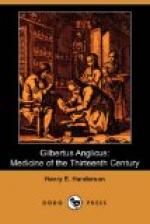The first edition of the Compendium is a small quarto of 362 folios (724 modern pages), five by seven inches in size, printed in double narrow columns, in black letter, perfectly legible and clear. The pagination shows some errors, but the text itself is remarkably accurate, though the presence of a multiplicity of contractions and ligatures renders the reading somewhat difficult to the modern student. On the last page we find the following colophon:
Explicit compendium medicine Gilberti Anglici correctum et bene emendatum per dominum Michaelem de Capella artium et medicine doctorem: ac Lugduni Impressum per Jacobum Saccon: expensis Vincentii de Portonariis. Anno Domini M.D.x. die vero vigesima mensis Novembris.
Deo Gratias.
The second edition (which I have not seen) is said to bear the title: “Laurea anglicana, sive compendium totius medicinae, etc,” Geneva, 1608.
It should be noticed that the title “Laurea anglicana” is not mentioned in the original edition of 1510, but is apparently due to the exuberance of enthusiasm of the editor of the later edition, whose taste seems to have been more flamboyant.
Various manuscript works of greater or less authenticity are ascribed to Gilbert by different authorities. Of these Mr. Kingsford furnishes the following list:
1. “Commentarii in Versus Aegidii
de Urinis,” quoted by John
Gaddesden
and probably authentic.
2. “Practica Medicinae,”
mentioned by Pits, but of doubtful
authenticity.
3. “Experimenta Magistri Gilliberti,
Cancellarii Montepessulani,”
noticed
on page 2, but authenticity doubtful.
4. “Compendium super Librum
Aphorismorum Hippocratis.”
MS. in Bodleian.
5. “Eorundem Expositio.” MS. in Bodleian.
6. “Antidotarium.” MS. in Caius College.
To these he adds, on the authority of Bale and Pits:
7. “De Viribus Aquarum et Specierum.”
8. “De Proportione Fistularum.”
9. “De Judicio Patientis.”
10. “De Re Herbaria.”
11. “De Tuenda Valentudine.”
12. “De Particularibus Morbis.”
13. “Thesaurus Pauperum.”
All of these latter may be regarded as doubtful.
The authorities named by Gilbert are Pythagoras, Hippocrates, Plato, Aristotle, Galen, Rufus, Maerobius, Boetius, Alexander of Tralles, Theodorus Priscianus, Theophilus Philaretes, Stephanon (of Athens?), the Arabians Haly Abbas, Rhazes, Isaac Judaeus, Joannitius, Janus Damascenus, Jacobus Alucindi, Avicenna and Averroes; the Salernian writers, quoted generally as Salernitani and specifically Constantino Africanus, Nicholas Praepositus, Romoaldus Ricardus and Maurus, and two otherwise unknown authors, Torror and Funcius, classed by Gilbert as “antiqui.” The latter author is also said to have written a “Liber de lapidibus.” Certainly this list suggests a pretty good medical library for a practitioner of the 13th century.




